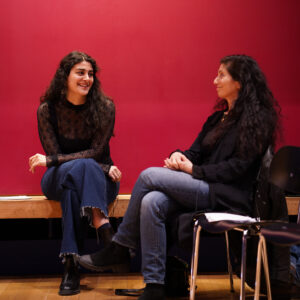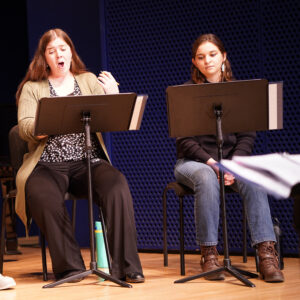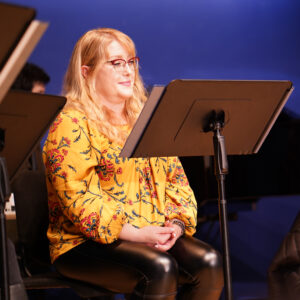Spoleto Festival USA today announced the cast and creative team for the world premiere performances of Ruinous Gods, a new full-length chamber opera by composer Layale Chaker and librettist Lisa Schlesinger at Spoleto Festival USA 2024. Announced earlier this year, the work explores the trauma of refugee syndrome through an operatic dreamscape depicting resignation syndrome, a child’s psychological response to displacement.
This production will be co-directed by theater directors, dramaturgists, and Zoukak Theatre Company founding members Omar Abi Azar and Maya Zbib, with costume design by Sarah Leterrier, scenic design by Joelle Aoun, and lighting design by James Ingalls. Conductor Kamna Gupta will lead from the podium, and the cast includes tenor Karim Sulayman, the creator of the opera Unholy Wars, premiered at the 2022 Festival, as Crow; Taylor-Alexis Dupont as Hannah; Teryn Kuzma as H’ala; Leroy Davis as Blue Dove and Dr. Undertow; Sharmay Musacchio as Swift; and Sarah Shafer as Sophia.
- Composer Layale Chaker, left, and librettist Lisa Schlesinger collaborate on Ruinous Gods at a March 2023 workshop in New York City.
- Singers Sarah Shafer, left, and Teryn Kuzma perform selections from Ruinous Gods at a March 2023 workshop in New York City. Kuzma sings the role of H’ala; Shafer sings the role of Sophia.
- Singer Sharmay Musacchio at a March 2023 Ruinous Gods workshop in New York City. Musacchio is cast as Swift in the world premiere production.
Grounded in testimonies from survivors and families of those afflicted with resignation syndrome, the evocative opera follows the experiences of a mother, Hannah, and her 12-year-old daughter, H’ala, who suffers from a traumatic response to the state of living in the limbo of displacement. Evident in refugee camps around the world, resignation syndrome causes the child, most often between the ages of 8 to 15, to fall into a non-responsive sleep.
Loosely based on the Greek myth of Persephone and Demeter, Ruinous Gods traces H’ala’s journey to an “underworld” landscape where she is joined by other children who have fled their homes. As H’ala sleeps, Hannah navigates the effects of her daughter’s detachment and faces unforgiving realities of their refugee status.
Though the work does not name a specific setting, pointed moments allude to camps on the island of Lesvos, the practice of familial separation, deadly water crossings, and a figure named “Jeb Fezos,” who represents society’s desensitization to billionaires’ gross spending on pet projects rather than initiatives for the common good. Despite the painful context of the characters’ situation, the work finds moments of friendship, empathy, humor, and hope in the darkest moments.
In a joint statement, Schlesinger and Chaker said: “Ruinous Gods challenges political otherness through music that amplifies marginalized voices and incites and fosters curiosity, connection, empathy, and openness.”
Musically, the work is rooted in the traditions of Arabic Maqam and Western classical music. Created for six soloists, a chorus, and a chamber ensemble of strings, oboe/English horn, bassoon, flute, clarinet, harp, percussion, and piano, the score includes the use of a microtonal keyboard. Said Chaker: “Its musical branches reach a multitude of musical landscapes and languages spanning contemporary classical music with influences from Arabic, Ottoman, Hindustani, Persian, Hindustani music, as well as jazz and free improvisation. It alludes in form and structure to the Chorus in ancient Greek tragedy, while some sung texts also stem from Babylonian and Assyrian divinations and incantations. The music of Ruinous Gods crosses different fields, including spoken word, pushing boundaries of forms and structures. Likewise, this musical experimentation aims to challenge canonical rules, rethinking microtonality, the relationships between untampered modality and tempered harmony, and cyclical and linear rhythms.”
Tickets will go on sale on January 26 with the announcement of Spoleto’s full season program for 2024. Ruinous Gods is co-produced and co-commissioned by Spoleto Festival USA, Opera Wuppertal, and Nederlandse Reisopera.




